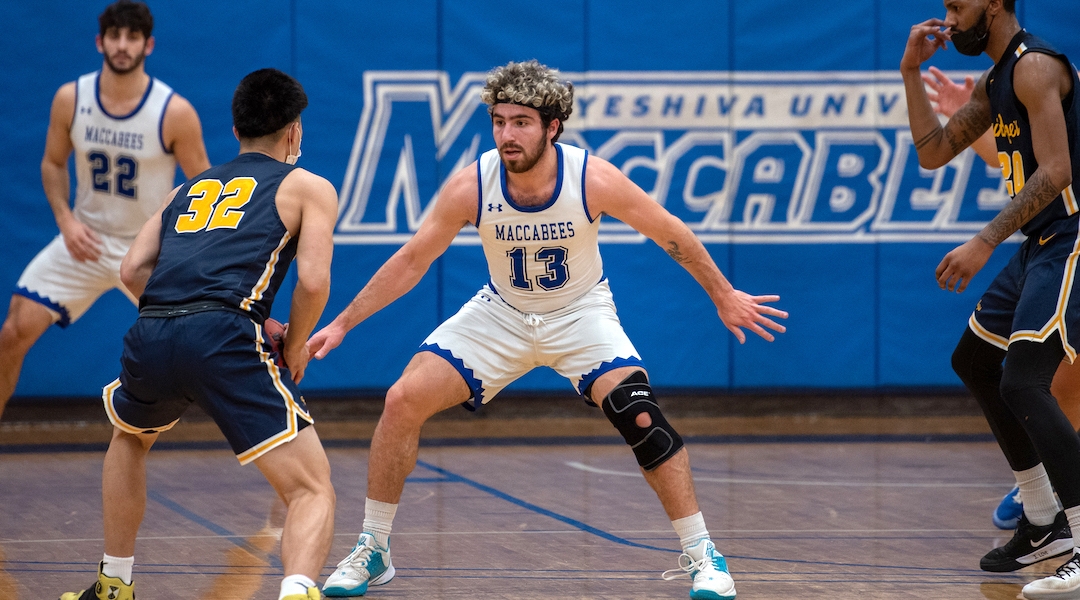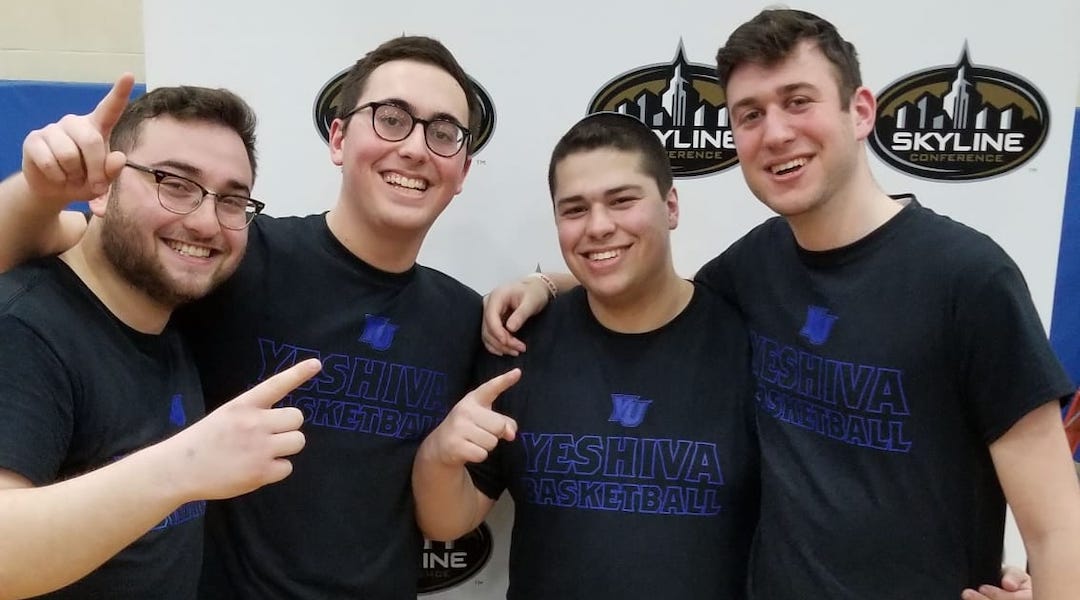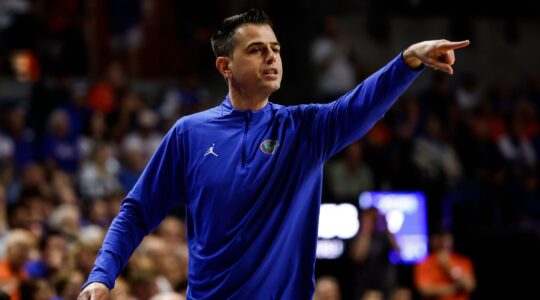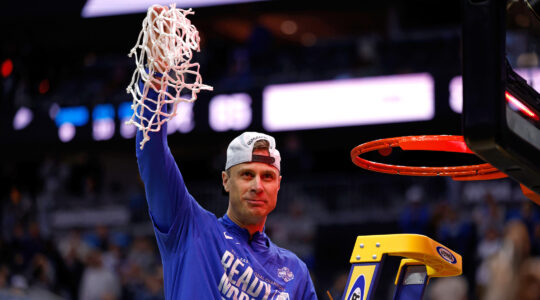(New York Jewish Week via JTA) — In early 2019, before his college’s men’s basketball team began a historic and unlikely winning streak, Jonathan Malek and three friends decided to catch a game.
Back then, it was easy to get a seat at a Yeshiva University basketball game. Their team, the Maccabees, which plays in Division III of the NCAA, wasn’t known as a powerhouse. But Malek and his friends were nonetheless taken by the idea of a Jewish team giving it their all on the court while wearing kippahs. They began a group text where they would chat about the Macs.
The only problem was they didn’t know many of the players’ names. As an homage to their ignorance, they named the group text “This Kid,” the anonymous moniker they would give to team members they didn’t recognize.
Two seasons and 50 wins in a row later, all that has changed. Yeshiva University’s team is 14-0 this season. They’re ranked number one in Division III, and getting attention not just from campus but from the likes of ESPN. The school’s athletic center is at capacity, at least in COVID terms, for every home game. The names of the stars — Ryan Turell, Gabe Liefer, Ofek Reef — have become known across New York Orthodox Jewish households and beyond.
Malek and his friends still faithfully attend the games. “I remember before the win streak, and honestly they didn’t get a crowd until the playoffs started,” he told the New York Jewish Week. “Games were pretty much empty. Now, with the win streak, if you’re not there a half hour before gametime, you’re not getting a seat.”
Like Malek’s quartet of superfans, Jews in New York and beyond are paying increasing attention to the Orthodox college in upper Manhattan that hasn’t lost a game since 2019 and just might win a national championship.
It’s a surprising turn for Y.U., which has historically been famous for rabbinics, not athletics. The flagship institution of Modern Orthodox Judaism, Y.U. has roughly 2,000 undergraduates, split between a men’s-only college in Washington Heights and a women’s-only college in midtown. At the men’s campus, where the team plays, students study Talmud in the morning and their secular curriculum in the afternoon, with classes often stretching into the night.
It’s a demanding schedule that doesn’t leave lots of time for pep rallies and the like, but students are nonetheless finding energy to follow the team. Professors are letting students out of class early to head to the athletic center. Thousands more viewers are tuning in online to games broadcast by students.
The administration, which did not respond to requests for comment, name-checked the team in its year-end fundraising drive, below notes about its Jewish educational centers and other academic programs.
“People can’t really imagine Jews dunking that much on an NCAA level,” said Charles Schaechter, another member of Malek’s group. “Seeing that happen on a regular basis and being able to blow out other teams is incredible. People are still shocked: Is this really Y.U.? Are we really watching our team play?”
The school’s small size contributes to the Macs’ appeal, students say, because in many cases they’re rooting for their friends and classmates. Malek has two classes with the team’s star, Ryan Turell — their morning Talmud lesson and a class on Jewish law in the workplace, where they sit next to each other. Turell’s parents, Laurel and Brad, are also fixtures at the games.
“Everyone in the school is in at least one class with one person” on the team, says Akiva Poppers, executive producer of MacsLive, a student-run platform that broadcasts home games on YouTube.
“It’s not like a school where the players walk around and they are celebrities,” Poppers said. “It’s not like a larger school where everyone knows the player, and the player doesn’t know anyone.”

Ofek Reef regularly scores in double-figures for the Yeshiva University men’s basketball team, currently enjoying the longest streak in men’s college basketball. (Courtesy Y.U.)
Despite that intimate feel, MacsLive has seen its audience skyrocket, from a few hundred viewers a few years ago to 8,500 for a recent game this year. It has also received $35,000 in donations and $12,000 in funding from departments of Y.U., allowing Poppers to run a crew of four cameras at games and show instant replays.
He has 50 students on his team, including a rotating crew of announcers who call every game and a reporter on the sidelines. The broadcasts include a short pregame show, a halftime show, postgame analysis, network-grade graphics and ads from sponsors, including “Better Image Contracting,” a rehab center and an Israeli nonprofit.
Yet the game experience at Y.U. differs from the rest of college basketball. The crowd sings “Hatikvah,” the Israeli national anthem, along with “The Star Spangled Banner.” Before a recent livestream, a MacsLive announcer referred to the game as taking place on “motzei Shabbat,” the Hebrew term for Saturday night after dark.
Malik and other fans readily admit that they need to put more effort into making up crowd chants. Then again, when March comes around they’ll burst out into “Mishenichnas Adar,” an upbeat song celebrating the Hebrew month, which usually coincides with the annual NCAA tournament. (The Division III tournament, cancelled last year due to COVID, culminates next March 18 and 19, in Fort Wayne, Indiana.)
“Within these two or three blocks of the Heights, I think it’s very special,” said Elazar Abrahams, Y.U.’s student council president. “Jews all over the country feel represented.”
One place where the Macs’ pull is not as strong is at Stern College, Y.U.’s women’s school, which is located in Murray Hill. While fans say that there are always women students in the crowd, they’re significantly outnumbered by their male peers. A women’s student council official declined an interview because she wrote that she is “not a huge follower of sports at YU.”
“Some people also just maybe don’t feel comfortable being in the guys’ building, so they won’t go and watch for that reason,” said Nina Yurovsky, who plays for Y.U.’s women’s team, about her classmates at Stern. “Some people also just don’t know enough about basketball or have interest in sports.”
Yurovsky also said that some women students may be disinclined to watch because, in August, a female student published an essay in The Commentator, the student newspaper, accusing an unidentified basketball player of raping her. In the piece, the anonymous writer wrote that after a lengthy investigation by the school, during which the administration asked her to sign a non-disclosure agreement, “I have been told to just deal with it and that nothing can be done by Y.U. — not one thing.” She specifically said the school has done nothing to ensure her safety on campus, and that she was called derogatory names in the presence of others by another team member after reporting the incident.
Y.U. did not respond to a New York Jewish Week request for comment regarding the rape allegations. Soon after the essay was published, the school told the Forward that it addressed the allegation “in a caring, sensitive, and compassionate manner fully consistent with our compliance policies,” and that it “immediately retained independent investigators to conduct a comprehensive inquiry into the allegations.”
The school told the Forward that it was “legally limited in what we are able to share” and that “a final determination was made based on a full evaluation of all available information.” The statement did not elaborate on what that determination was.
A subsequent letter to students from Karen Bacon, dean of the Undergraduate Faculty of Arts and Sciences, said that the administration had started meeting with groups of students to discuss their concerns. She wrote that the school would update its website to better display processes for reporting allegations of sexual misconduct as well as resources available to students. The letter added that the school supports “reporting any incident to the police”; under the federal civil rights law known as Title IX, reporting to the police is considered a personal choice of the accuser.
Several students declined to comment on the record regarding the rape allegation, and Yurovsky said student protest regarding the university’s response has “toned down” recently. A private student Facebook group created in response to the school’s handling of the allegation, “We Stand with Survivors,” had 221 members as of December 20. There was also a walkout planned to protest the school’s response, but it was later cancelled, according to the Yeshiva University Observer, the student paper of the women’s college.
Additionally, some women at Stern have complained that women’s sports receive far less attention than the male teams. That is a common complaint across all of collegiate sports, but Y.U.’s Orthodox affiliation and gender separation add a layer to that disparity.
Because of traditional Jewish modesty laws, the school prohibits the women’s team from playing in the athletic center on the men’s campus, where men would be able to watch women playing in shorts in a Yeshiva facility, according to the Commentator. There is no restriction on women watching the men’s team.
Because of that, the women’s team plays its “home” games in other facilities, such that, Yurovsky said, “basically all our home games are away games.”
Yurovsky added that though there isn’t much communication between the women’s and men’s teams, it is “thrilling” to watch the men’s success, and that she sees ways to improve her own play while watching their games.
Another sports maven who appreciates watching the Macs’ gameplay is Aaron Kaplowitz, who used to write about basketball for publications including The New York Times. He has been to all but one Macs game this season — home and away — and calls them “the most selfless college basketball team you’ll see.” He recalled a particularly exciting and nerve- wracking game came on Nov. 28, against Manhattanville College, when the Macs were trailing at halftime. The game was saved by Turell, who scored 51 points, a school record.
“There was a point in the second half where he just put his head down and took over,” Kaplowitz said.
Moments like that are still exciting, but they’re also becoming less of a surprise as the team wins again and again (although followers note that its next game, on Dec. 30 against Illinois Wesleyan University, the number-four team in the country, will be a test).
“The fans have extremely high expectations of the team,” Schaechter said. “People can’t imagine Y.U. losing a game anymore.”
The New York Jewish Week brings you the stories behind the headlines, keeping you connected to Jewish life in New York. Help sustain the reporting you trust by donating today.




